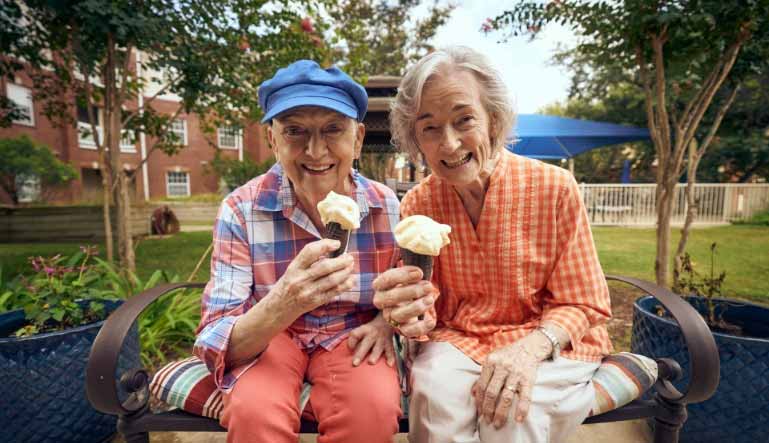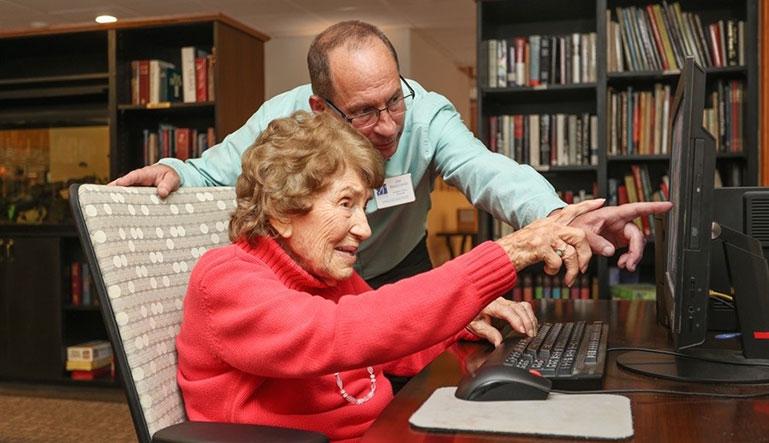Memory care communities provide a home with round the clock personalized care for older adults that have conditions like dementia and Alzheimer’s. With skilled team members, engaging activities, and safe environments, memory care communities are designed with a focus on improving quality of life and reducing confusion for residents. There are often misconceptions about memory care—that it’s a cold, clinical facility where residents are left to entertain themselves. This is far from the truth. Resident life at a memory care community is rich and full. The best memory care communities provide your loved ones with a place that feels just like home with a warm atmosphere and community of residents that feel like family. Many communities offer private or shared apartments that can be decorated and styled to suit your loved one. Moving a loved one who has a condition like dementia offers them engagement with activities and therapies, but it’s not just the residents who benefit. Caregivers and families can have peace of mind that their parent or grandparent is somewhere where they can thrive.
Table of Contents
How Does Memory Care Work?
When a loved one is diagnosed with a condition like Alzheimer’s, it can create a difficult mix of emotions for family members and caregivers. While day-to-day life becomes more challenging, there are ways to make a home safer for a loved one with Alzheimer’s, but it can be costly. At a memory care community, dedicated team members offer assistance to residents through enriching activities that stimulate cognition and improve wellness while helping maintain their skills for as long as possible.
At Five Star, highly trained memory care specialists enable residents with the exclusive and innovative
What are the benefits of Memory Care?
There are numerous benefits to memory care for both older adults with memory conditions and their family members or caregivers. When an older adult is diagnosed with a condition like Alzheimer’s memory care can cater to that person’s every need from dressing and eating to keeping them active with therapies and programs.
Taking care of a loved one with dementia is a major undertaking for anyone. Moving your loved one to memory care can give them the attention and mental stimulation they need everyday. Plus, memory care communities encourage visits! Take a trip to a community to celebrate a birthday or just to play a game with your loved one.
What’s the difference between Memory Care and Dementia Care?
Dementia is an umbrella term for loss of memory and other thinking abilities like Alzheimer’s and vascular dementia that are severe enough to disrupt someone’s everyday life. Memory care, sometimes referred to as dementia care, offers curated programs and schedules for residents with memory conditions like dementia, using therapies and classes that help soothe them.
Do dementia patients need nursing care?
It depends on a person’s physical abilities. Nursing care is for a patient that needs round the clock care and monitored medical attention. A person with a dementia condition may not need a high level of medical attention, but would still need round the clock care.
Do people with Alzheimer’s need 24-hour Memory Care?
Yes. Alzheimer’s is a degenerative disease which causes gradual loss of memory and can cause difficulty walking, talking, as well as personality changes later on. As cognition declines, people with Alzheimer’s need more assistance with activities of daily living (ADLs) such as drinking enough water, eating regularly, and not getting lost.
What’s the difference between Memory Care and Assisted Living?
Memory care and assisted living have similarities like scheduled activities, great dining, and dedicated team members, but their main difference is in their level of care. Assisted living gives residents personalized support where they need it such as medication management or meal assistance, but with the aim of enhancing independence.
Memory care residents need more hands-on support and specialized activities to enhance cognitive performance. For example, an assisted living resident may need help getting dressed in the morning, but can take a bus to the mall, eat by themself in the dining room, and play card games with friends. A Memory care resident needs more focused care to make sure they are eating regularly, staying engaged, and socializing. Many communities offer continuity of care—letting residents in assisted living move into memory care if their needs require it. This allows families to easily have their loved one stay in a familiar space.
What’s the difference between memory care and a nursing home?
Memory care and nursing homes are both long-term care options for older adults with memory issues that provide 24-hour care, supervised support, meals, and housing. They also are staffed by skilled team members who help with bathing, dressing, and medication management. It’s important, however, to know there are some key differences between the two. Memory care is specialized for older adults with memory loss. Residents live in a safe environment that creates familiarity and reduces anxiety and stress. A nursing home is focused more on a patient that needs a high level of medical care. Usually these seniors can’t care for themselves, are bedridden, need a wheelchair, or require nursing care.
Is Memory Care right for my parent or loved one? 8 signs it’s time for Memory Care
Everyone can forget where they put their keys, but when forgetfulness turns into difficulty doing regular everyday tasks, it might be a sign of dementia. Dementia is a scary word that many adult children fear. It can feel like a loved one can no longer live a fulfilling life or that they will lose control of what they do. While a dementia diagnosis can create mixed emotions, it’s important to know that it doesn’t mean your loved one can’t lead a fulfilling life.
The signs can be hard to see—maybe your parents are having more difficulty with regular tasks or they can’t recall memories as well. Here’s a list of some early signs of a memory-related condition:
- Difficulty finding words
- Trouble writing
- Forgetting important appointments
- Quick to anger
- Becoming tearful easily
- Misplacing items in strange locations
- Inability to remember names
- Withdrawing from social circles
Memory doesn’t just keep your loved ones safe, but situates them in an environment where they can thrive, socialize, and feel connected.
Memory Care vs. home care – which is better?
Once a loved one has been diagnosed with a memory condition it can be hard to adjust, for everyone. The challenges of dementia can feel big, but they’re not insurmountable. Many adult children think of home care as a way to keep their parent in a familiar space, but home care comes with its own set of challenges like safety proofing the house, paying for caregivers to come into the house regularly or round the clock. Sometimes an adult child has to take on the burden of being a caregiver which can add more stress to an already difficult situation. Memory care offers the specialized care and attention your loved one needs in one package. Bathing, dressing, dining, and staying engaged are all included at memory care communities.
Here’s a list of the pros and cons of each:
Home care pros
- Senior stays in their own house
- Caregiver can be a son, daughter, or other relative
Home care cons
- Can be expensive (safety proofing, professional caregiver costs)
- Seniors can become isolated
Memory Care pros
- Skilled team members handle 24/7 care
- Enriching activities and therapies offered every day
- Set schedules for dining, water breaks, and rest
- Socialization with other residents with memory conditions in safe environment
Memory Care cons
- A new setting
- Can lead to caregiver guilt for adult children
Who is Memory Care best suited for?
Memory care is best suited for older adults with memory conditions, especially if they have been diagnosed. It’s best to know what stage your loved one is at with their condition. Forgetting where they put their phone is different from forgetting to attend important appointments or a change in personality. It’s best to talk to your loved one, their doctor, friends, and other relatives to see if they feel concerned. Memory care is beneficial to older adults in many stages of dementia. With the ability to decorate their apartments, socialize with other residents, and attend stimulating activities, memory care residents are able to continue living fulfilling lives.
What does Memory Care cost?
One of the many factors to take into consideration when looking at memory care is cost. But keeping a loved one at home can add up when you account for safety improvements and round the clock care. Memory care gives families everything in one place so they know their loved one is taken care of. The median cost of assisted living nationwide is $4,300 monthly, according to the 2020 Genworth Cost of Care Survey. It rises to $4,800 a month in New York ($5,991 in New York City) and $6,633 in Alaska, but falls as low as $3,800 in North Carolina. Memory care services can increase this baseline assisted living expense by varying amounts, depending on the area.
Additionally memory care includes expenses that would be otherwise be separate:
- Electricity
- Heat and cooling
- Water
- Rent or mortgage
- Landscaping
- home maintenance
- Food
- Transportation
- Activities
- Professional caregivers
Talking about moving to Memory Care with a loved one
It’s never easy to broach the topic of moving to memory care. Fear and confusion can lead to aggression which can be made worse by memory conditions. It’s best to avoid phrases like “you have to move” and “you can’t live here.” Instead approach the topic with compassion and understanding. Keep an open mind with your loved one and share the benefits of memory care and how it can make their lives more enjoyable. Your loved one may ask why they have to leave or what it’s like at a memory care community. Remind them this is not a clinical setting—it’s a warm and welcoming one with other residents and activities. Here are some other tips for starting the conversation:
- Set realistic goals: Unless this move must happen quickly, try to be reasonable about how fast it happens. Rushing through a relocation will increase anxiety for you and your loved one.
- Establish a timeline: After you determine a realistic date for the move, sit down and create a timeline. If you are the primary family caregiver for your loved one, you may need to enlist friends and family to help or hire a professional move manager.
- Plan ahead for the day of the move: The day of the move will no doubt be hectic. For an adult with dementia, it can increase agitation and anxiety. Make sure you create a moving day plan for your family member. It may involve them staying with a loved one while you are packing up for the move. Or you could have a friend supervise the movers while you go ahead to the community. The goal is to minimize your family member’s exposure to moving day chaos and stress.
- Create a familiar environment: The transition will go more smoothly if you try to make the new apartment or suite look and feel like their old home. Ask for a copy of a floor plan ahead of time. That will help you figure out what furniture and belongings will fit. Make sure you bring family photos, familiar wall décor, bedding, and other belongings.
What support is included at a Memory Care facility for families and caregivers?
It’s not just residents who are supported at memory care—you are too! Many memory care communities offer respite care so caregivers and adult children can take a break. One hesitation for family caregivers is that they fear feeling guilty. It’s important to remember to never feel guilty for moving a loved one on to memory care. Your loved one with a memory condition will be in a safe, warm, and mentally stimulating environment with other residents. They can meet new friends, have fun, and spend time outside with a team of skilled professionals.
Many memory care communities also offer caregiver support groups. These can be hosted at a community or online and can give caregivers a support system with others who may be going through similar situations.
Maintaining an active senior lifestyle in Memory Care
At memory care communities you can walk down the halls and see residents playing games, socializing together, pursuing hobbies, and relaxing with therapies. Memory care residents don’t just stay inside all day either. Many communities have enclosed courtyards that offer an outside space so residents can chat about their lives for a morning gathering or take in the sun on a clear day.
How to find the right Memory Care community near you for your needs
There’s plenty of factors to consider when deciding which community to choose. Make sure to tour the community so you know exactly what the space feels like and how team members interact with residents. Also, while it’s important, don’t get stuck on location. It’s important to decide if you want a family member close by, but the quality of care is what will keep your mind at peace and keep your loved one thriving. When you tour a memory care community make sure to talk to team members, read through the activities calendar, and see how secure the buildings are.
Find a Memory Care Facility Near You
Five Star Senior Living offers small and intimate memory care neighborhoods where your loved one can find peace of mind and a renewed sense of purpose in a specialized environment that feels just like home sweet home. Our Memory Care and dementia care program also provides personalized memory care based on your loved one’s specific abilities, preferences and passions. Find a memory care community near you to learn more about how a Five Star can help your loved one with dementia rediscover a meaningful life full of joy and purpose.
Contact Us Today

![How Much Does Memory Care Cost? [2025]](https://www.fivestarseniorliving.com/wp-content/uploads/2022/07/i-Nvm8GsN-X3.jpg?ver=1710520827)








